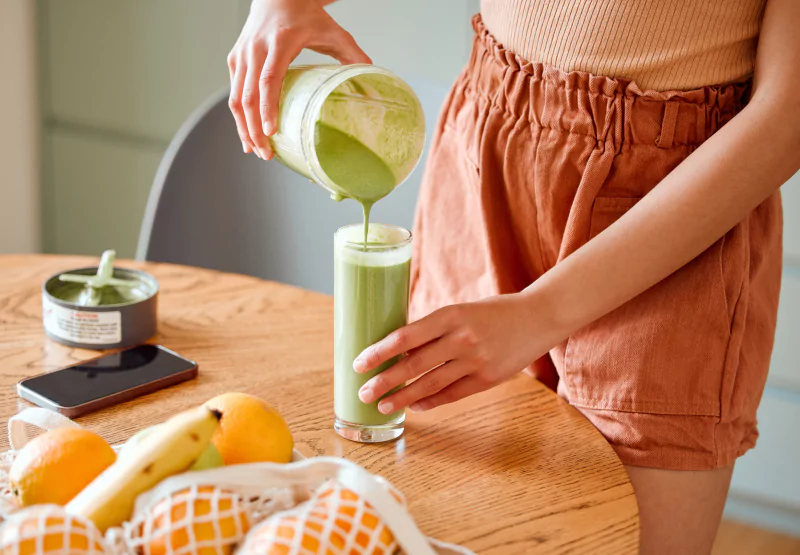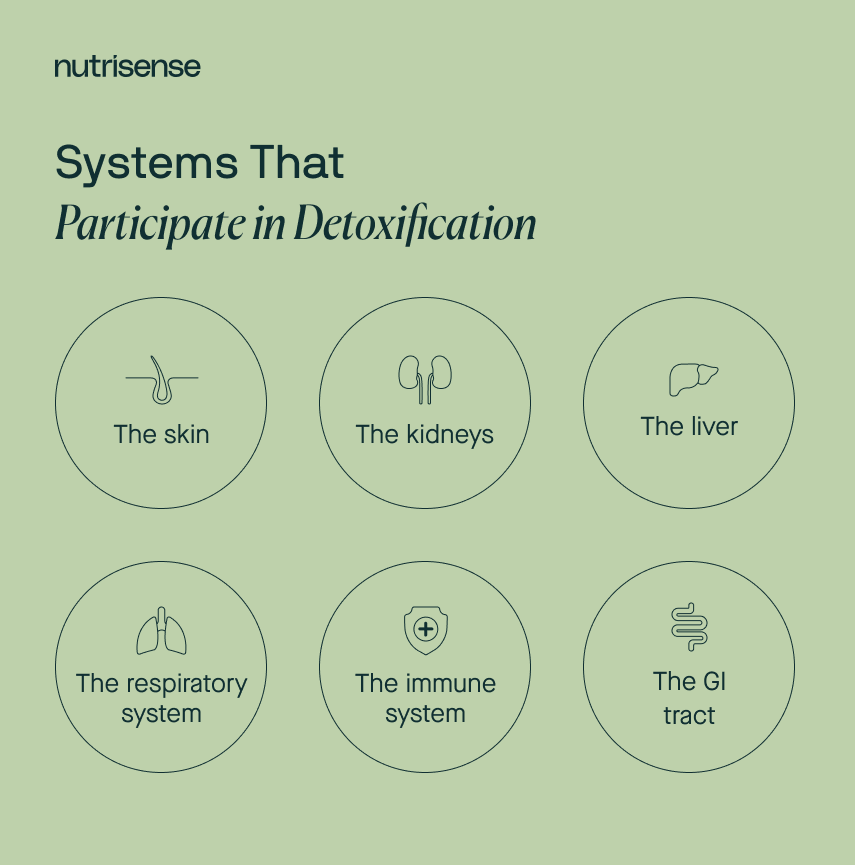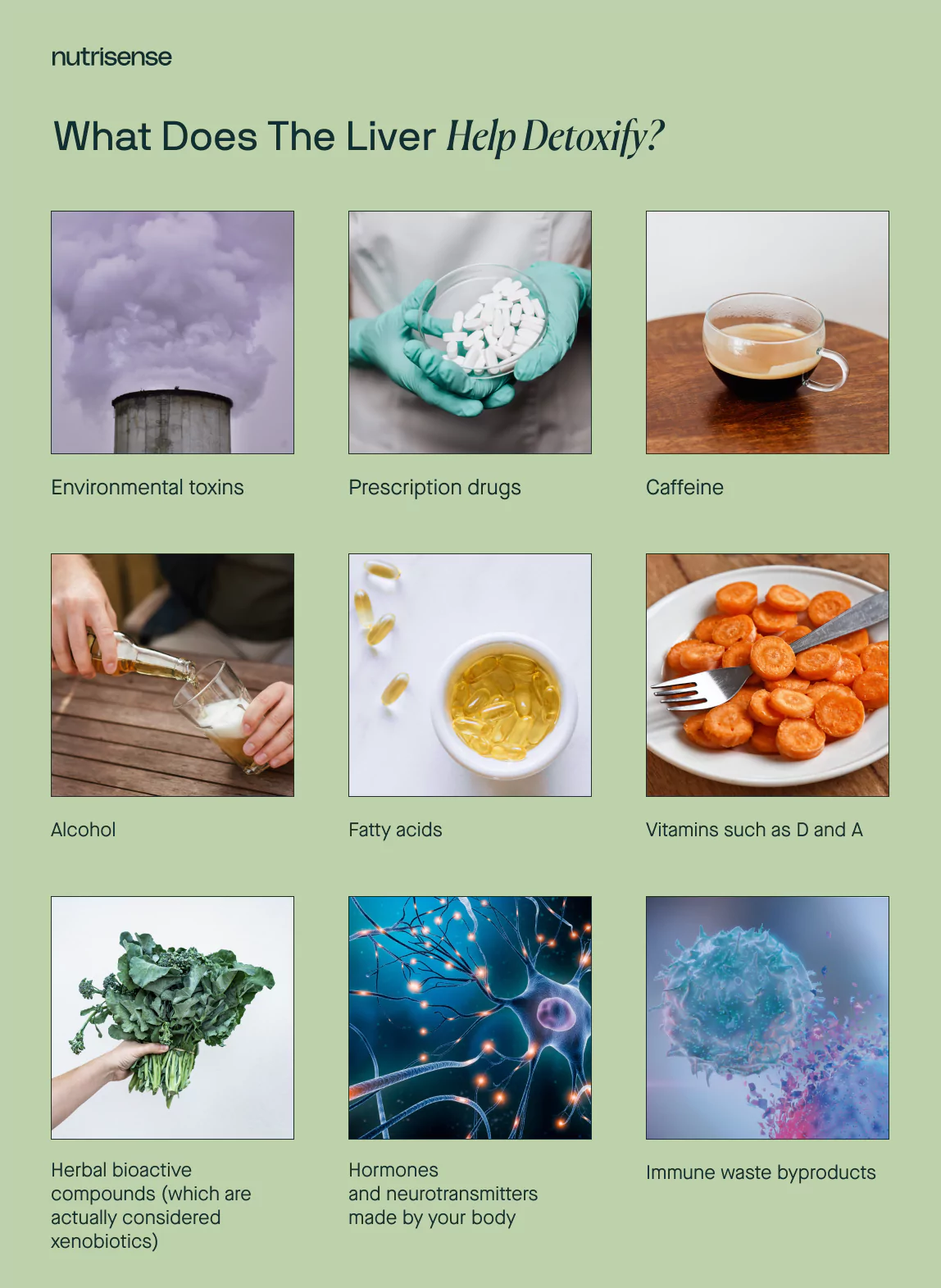What Are Detox Drinks?

Key Takeaways
You may already be familiar with a variety of concoctions marketed under the collective heading of “detox” products. Some are drinks, others are encapsulated powders, and still others label themselves as entire “detox diets.”
These detoxes tend to promise everything from improved skin and gut health to boosting weight loss and energy, but is there any evidence to support these claims?
What’s the science behind these products and approaches? Do they work? Do we need them in order to be healthy?
To answer all of these questions, it’s important to first explore what detoxification is and how it really works in your body.
What is Detoxification?

When you think of the word detoxification, chances are you’re picturing your body cleansing itself of all unwanted substances or toxins. In a world where there is no shortage of toxic substances to contend with, it’s no wonder that detox products capture our attention.
Toxins and the Modern World
In the United States, over 80,000 chemicals are currently registered for use, with around 2,000 novel varieties introduced each year. These are most commonly added to foods, cosmetics or body care products, prescription drugs, cleaning products, and even landscaping or agricultural products.
The CDC’s Fourth Report on Human Exposure to Environmental Chemicals provides data for detecting over 300 chemicals in human bodily fluids (blood, serum, urine). It aims to track and investigate what’s known as the “body burden”.
Body burden is the comparison of the amount of a given chemical in your body at any given time with how quickly your body is capable of removing it. When you are repeatedly exposed to a chemical, this may result in a build up and increased body burden of the chemical. If the time between exposures is long relative to your body’s ability to excrete the chemical, it’s less likely to build up.
Knowing all of this might make detox drinks, diets, and supplements sound more appealing than ever. But can they help you improve your health?
Do Detox Drinks Work?
To date, there’s unfortunately not a lot of good evidence to support the use of any detox method for weight management or the elimination of most toxins from the body. There have also been no studies on long-term effects of “detoxification” programs.
One 2017 review stated that juicing, detox drinks, and detox diets may cause initial weight loss as a result of low intake of calories, however they tend to lead to weight gain once a person resumes a normal diet.
The FDA and FTC have also taken action against many companies selling detox/cleansing products because they:
- Contained illegal, potentially harmful ingredients
- Were marketed using false claims that they could treat serious diseases
- Were marketed for unapproved uses (in the case of medical devices used for colon cleansing)
Types of Detox Cleanses
Here are some of the most common natural ingredients you might find in “detox” cleanse drinks, juices, or smoothies:

Though some of these items may have certain health benefits, like apple cider vinegar, their ability to act as “detoxifiers” may not be as straightforward.
Sometimes people may also try aggressive laxatives or extended fasting approaches for their detox protocol. However, these strategies can potentially lead to electrolyte imbalances.
Depending on the fasting protocol, it could also potentially impair detoxification. This is because the body’s internal detoxification systems require specific nutrients in order to function. If you deprive the body of those nutrients for extended periods, this could become a problem for detoxification.
So how does the body’s built-in detoxification system work, anyway? What’s it doing for us and how can we help it be better at its job?
The Body’s Detoxification Systems
The body has pretty impressive internal detoxification systems that work 24/7. Supporting those systems with sustainable lifestyle and dietary changes may be the most effective way to support healthy detoxification.
Let’s take a closer look at these amazing systems and then talk about some practical ways you can keep them running optimally.
Your Organs of Elimination
Your body is quite good at dealing with many toxic compounds, given the right support. There are many systems in the body that participate in detoxification and they include:

Focusing on the Liver
The liver is a particularly important detoxifier, filtering 1.4 liters of blood per minute. It stores many nutrients, participates in protein synthesis, hormone production, glycogen storage, and breakdown of red blood cells. It also concentrates toxic substances and metabolic waste products for detoxification.
The liver often receives the most attention for its role in detoxification, also known as the process of biotransformation. This is because it has specialized enzyme systems known as Phase I and Phase II Detoxification processes, that work in unison to metabolize all kinds of toxins and wastes all day long, every day.
Phase I and Phase II Detoxification
Your liver detoxification systems handle a lot. Due to the way this system works closely with nutritional and genetic factors, it’s worth talking a little more about.
Here are some things they help you metabolize and excrete:

In Phase I, cytochrome P450 enzymes (CYPs) convert the original waste product or toxin into uniquely reactive metabolites and free radicals that can be further processed in Phase II.
“Think of it like a relay race: as one person hands off the baton to the next person in line, that next person has to be ready to go! Phase II is the next one picking up the baton - and it better be ready!”
In Phase II, the reactive intermediates or compounds produced in Phase I are made more water-soluble through a process called conjugation. Here, the reactive intermediate teams up or “joins hands” with a helper molecule that allows it to be safely removed from the body. Some of the helpers include things like:
- Glucuronic acid
- Sulfate
- Glutathione
- Amino Acids
- An Acetyl Group
- A Methyl Group
Specialized enzymes are also involved in helping these compounds form a team that ushers the waste out of the body.
Your genetics impact how your Phase I and Phase II enzymes work. However, nutrition plays a big part as well. Though both phases require nutrient cofactors or partners in order to function optimally, Phase II may be relatively more dependent upon them.
6 Tips for Supporting Healthy Detoxification
Now that you understand how the detox process works in the body, here are a few evidence-backed things you can do to support this process. Keep in mind that before making significant changes to your diet, you may want to consult a qualified healthcare professional or registered dietitian for guidance.
1) Stay Hydrated
With so many fancy “detox” products lining the shelves, it’s easy to forget how something as simple as water can be so powerful. Keeping your body adequately hydrated may be important for skin health, neurological function, gastrointestinal and kidney functions, and body weight and composition.
When your liver moves waste products through Phase II, they become water-soluble and water is needed to help shuttle them out of your body through urine and feces.
2) Get Enough Protein and Essential Fatty Acids (EFAs)
Not only will protein help support glucose regulation and a healthy weight, but protein provides amino acids necessary for Phase II to function. If you remember from the list above, amino acids are one of the many critical helpers in Phase II, ushering reactive intermediates from Phase I out of the body.
Essential fatty acids (EFAs) like omega 3s from fatty fish such as salmon are involved in a number of functions related to liver health and may support some detoxification processes.
3) Meet Your Vitamin and Mineral Needs
Research shows that a diet rich in micronutrients (vitamins and minerals) is essential for supporting detoxification systems. This study also suggests that sourcing these nutrients primarily from whole foods (as opposed to supplements) may be more beneficial for achieving the right balance.
With nutrient supplements, it’s important to always talk with your doctor and nutrition expert such as a dietitian to learn more about whether or not supplements are right for you and what dosages to use.
Studies show that high intake of vitamins and minerals above what is recommended for physiological function do not offer any benefit, including for detoxification, and may in fact cause more harm than good.
Some of the main micronutrients needed for Phase I and Phase II detoxification support as well as antioxidant support include:

Remember, researchers recommend opting for whole food sources first.
4) Consider Phytochemicals from Whole Foods Instead of Supplements
Phytonutrients come from plants and are types of bioactive compounds that usually form part of the plant’s immune system. As many researchers have pointed out, nutrients and phytonutrients from whole foods may offer superior benefit to these nutrients and phytonutrients in isolated supplements.
This may be because:
- There’s a synergistic relationship between nutrient/phytonutrient amounts, meaning their beneficial effects are most noticeable when working together.
- Isolated bioactive compounds or phytonutrients in high dosages or concentrations may cause the opposite effect of lower dosages. Supplements are more likely to come in high dosages, whole food in more moderate dosages.
Some other specific foods that help support Phase I and Phase II detoxification may include:

5) Reduce Your Sugar Intake
Studies have also shown that higher intakes of sucrose may inhibit some Phase II enzymes. In addition to seeing the benefits of a reduction in sugar in other areas of metabolic health, this is yet another reason to watch your sugar intake.
6) Minimize Environmental Exposures
As you learned earlier on in this article, the balance of toxin exposure vs. how quickly our body eliminates those toxins plays a role in the body burden. If you are able to support your body’s internal detoxification systems, that goes a long way to help your efforts.
However, the other side of that equation is related to our environmental exposures. Though it’s impossible to avoid coming into contact with xenobiotics or other potentially disruptive or toxic substances, there are things we can do to help minimize those exposures.
Our article on creating a healthy environment offers some easy ways to get started!
Find the right Nutrisense programto turn insight into progress.
Go Beyond Glucose Data with Nutrisense
Your glucose can significantly impact how your body feels and functions. That’s why stable levels are an important factor in supporting overall wellbeing. But viewing glucose isn't enough. Nutrisense, you’ll be able to learn how to use your body's data to make informed lifestyle choices that support healthy living.
One-to-one coaching
Sign up to access insurance-covered video calls to work with a glucose expert: a personal registered dietitian or certified nutritionist who will help tailor your lifestyle and diet to your goals.
Monitor and measure what matters
With the Nutrisense CGM Program, you can monitor your glucose with health tech like glucose biosensors and continuous glucose monitor (CGM)s, and analyze the trends over time with the Nutrisense App. This will help you make the most informed choices about the foods you consume and their impact on your health.
Find your best fit
Ready to take the first step? Start with our quiz to find the right Nutrisense program to help you take control.

Victoria began her career in the functional medicine space in 2015. She has extensive experience interpreting labs and supporting weight loss, gut imbalances, and chronic migraines. She received her Bachelor of Science degree in nutrition and dietetics from Missouri State University.




